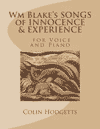
COLIN HODGETTS - William Blake’s Songs Of Innocence And Experience
Private Label ISBN: 9798768431938
In 1789, William Blake privately printed, hand-coloured and published a collection of 19 poems under the title, Songs Of Innocence. Five years later he adapted and expanded the collection creating a second part consisting of 25 poems, Songs Of Experience. Together the two sets of lyrics were intended to demonstrate The Two Contrary States of the Human Soul. Several poems in the first section – pre-Fall, pre-Industrial Revolution – were balanced by same-titled poems on the same theme in the dark Satanic second volume – Little Boy Lost, Little Boy Found, Holy Thursday – and stark contrasts like, Little Lamb / The Tyger.
This is reflected in Scots songwriter Colin Hodgetts’ settings – light, positive melodies for Innocence, darker, minor tune for Experience, often connecting parallel poems with musical leitmotifs. The collection’s title has naturally prompted settings in the past – Vaughan-Williams, Britten, Taverner, Holbrooke, Jah Wobble, Dave Walters, Greg Brown, Helen Hockenhull and Allen Ginsberg are the most noteworthy. What makes Hodgetts’ work different is the simple fact that he has given himself the challenge of providing settings for all 45 poems.
Realising that, like Wordsworth and Coleridge after him, Blake’s inspiration for the form, style and language of his poems was traditional song, he has created simple, direct, effective but most importantly appropriate tunes. Innocence draws on the unspoiled pastoral world of folk song, while the ruined urban condition of Experience informed by the darker melodies of the big ballads.
Blake’s lyrics may be over two centuries old, but not only do they capture a Britain facing revolution in its colonies, increased expectations of the ability to travel and transport, and massive changes in employment and working conditions brought on by advances in technology, they also reflect a music in danger of being lost to outside influences. Sound familiar? Sound relevant? Here are songs as cryptically evanescent as a Dylan lyric, as bitingly satirical as a Billy Bragg song, as empathetic with the tradition as the work of Lal Waterson. Blake’s London is an earlier, saddened vision of the same streets Ralph McTell takes us to.
Unlike some of his predecessors, Hodgetts does not set out to overshadow Blake’s work by flashy demonstration of inventiveness or performance. These are tunes, like folk music, intended for anyone to perform, each printed with complete parallel lyric and above the stave guitar chords. “Songs, everyone may joy to hear.”
Colin has kindly offered to send a free copy of the collection to the first six performers to contact him via email - colin@colinhodgetts.co.uk. And the book is available from Amazon for £5.99.
Nigel Schofield
This review appeared in Issue 145 of The Living Tradition magazine
